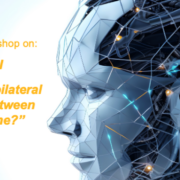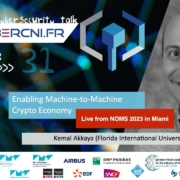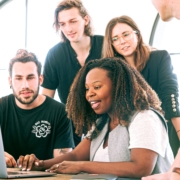On Fri, May 12th, 2023, 3pm CET, Kemal Akkaya (Florida International University, USA), will talk about “Enabling Machine-to-Machine Crypto Economy“. You are cordially invited to come or join the free live stream on youtube and LinkedIn! Please share the link https://talk.cybercni.fr/31 with your interested friends!
Trailer: https://youtu.be/qeWtIY3X2A4
LinkedIN Event: https://www.linkedin.com/events/7061340540599971840
Facebook Event: https://www.facebook.com/events/769049331352499/
Youtube: https://www.youtube.com/watch?v=ZwkWFueBBAU?list=PLdftPKA9mTfaDJxqwexil2mPhUFIA9ITd
Stream redirect (for every edition): https://TALK.cyberCNI.fr/stream
Newsletter with invitations: Subscription on https://TALK.cyberCNI.fr
Help us spreading the news
The best talks are those with an interested diverse audience! Therefore, please use the following media to spread the news in your networks:
Thank you!
Abstract
Internet of Things (IoT) devices from tiny sensors to autonomous cars are becoming an indispensable part of life. To create an effective IoT ecosystem, it is critical to enable paid data and service sharing among IoT devices which will require the ability to make a machine-to-machine (M2M) payment to a service provider for services such as parking, vehicle charging, sensor data sale, internet sharing, vending machine among others. Since this ecosystem will be dependent on financial micro-transactions among IoT devices, a reliable payment system without human intervention is desirable for a seamless experience. As IoT evolves over time, cryptocurrencies, in particular Bitcoin, can play a critical role by serving as digital money in creating such an M2M economy. The successful integration of IoT and Bitcoin technologies will foster this M2M economy by introducing novel applications such as automated payment among sensing devices, and programmable financial transactions for consumer electronics. Nevertheless, this brings many new challenges to be tackled as it is imperative to have cost and space-efficient real-time cryptocurrency solutions for resource constrained IoT devices. In this talk, we will first discuss the elements of M2M crypto economy and then present some solutions that can enable making Bitcoin transactions from IoT devices through Bitcoin Lightning Network (LN) and how LN solutions can be helpful in making offline transactions among IoT devices.
Watch the trailer here.
Kemal Akkaya
Dr. Kemal Akkaya is a full professor in the Department of Electrical and Computer Engineering with a joint courtesy appointment in the School of Computer and Information Sciences at Florida International University (FIU). He received his PhD in Computer Science from University of Maryland Baltimore County in 2005 and joined the department of Computer Science at Southern Illinois University (SIU) as an assistant professor. Dr. Akkaya was an associate professor at SIU from 2011 to 2014. Dr. Akkaya leads the Advanced Wireless and Security Lab (ADWISE) in the ECE Dept. His current research interests include security and privacy, internet-of-things, and cyber-physical systems. He is the EiC of Springer Computer Science journal, area editor of Elsevier Ad Hoc Network and Computer Networks Journal and serves on the editorial board of IEEE Communication Surveys and Tutorials. Dr. Akkaya was the General Chair of IEEE LCN 2018 and TPC Chair for IEEE ICC Smart Grid Communications. Dr. Akkaya was listed among the top 2% scientists in the world according to a Stanford University study in 2019. He also received FIU Faculty Senate Excellence in Research Award and FIU College of Engineering and Computing Research Award both in 2020. Dr. Akkaya is a Fellow of IEEE.
About Florida International University (FIU)
FIU is Miami’s public research university. Offering bachelor’s, master’s, and doctoral degrees, both on campus and fully online, FIU is worlds ahead in its service to the academic and local community. Designated as a top-tier research institution, FIU emphasizes research as a major component in the university’s mission. For over four decades, FIU has positioned itself as one of South Florida’s anchor institutions by solving some of the greatest challenges of our time. It is dedicated to enriching the lives of the local and global community. With a student body of more than 56,000, FIU is among the top 10 largest universities in the US and has collectively graduated more than 275,000 alumni, 165,000 of whom live and work in South Florida.
Talk.cybercni.fr
The Cyber CNI Lecture Series is a free monthly event that typically takes place on the last Wednesday of the month from 2pm to 3h30pm CET.
The event consists of a 45-minute expert presentation followed by a 45-minute discussion.
The Cyber CNI Speaker series aims to raise awareness and understanding of cyber security issues among all audiences. It aims to enable an ongoing dialogue between experts from industry and academia and the general public (citizens, families, small and large businesses, public organizations, etc.). All of us are concerned.
The events are broadcast live on Youtube (https://talk.cybercni.fr/) and LinkedIn, allowing worldwide remote participation – including a tool to participate in the discussion.
You can add the event calendar via ICS, webcal, HTML.
The COVID-19 pandemic has shown all of us the benefits of information technology. It allows us to work at a distance, to live at a distance, and most importantly, to keep in touch at a distance – with younger and older people, those closest to us, and even make new contacts.
Our society relies more and more on information and operational technologies. Examples include water, energy, heat and cooling supply, communications, healthcare, production and processing of goods, transportation, national security, banking, research and education, and food production.
What all these areas have in common is that they make intensive use of networked distributed computer systems. These systems can be attacked in many ways. This is no longer just a problem for computer “pros” because computer systems are essential to all of us. The effects of “cyber-attacks” range from power outages to the collapse of the health care or banking sectors.
Program and registration: https://talk.cybercni.fr/





